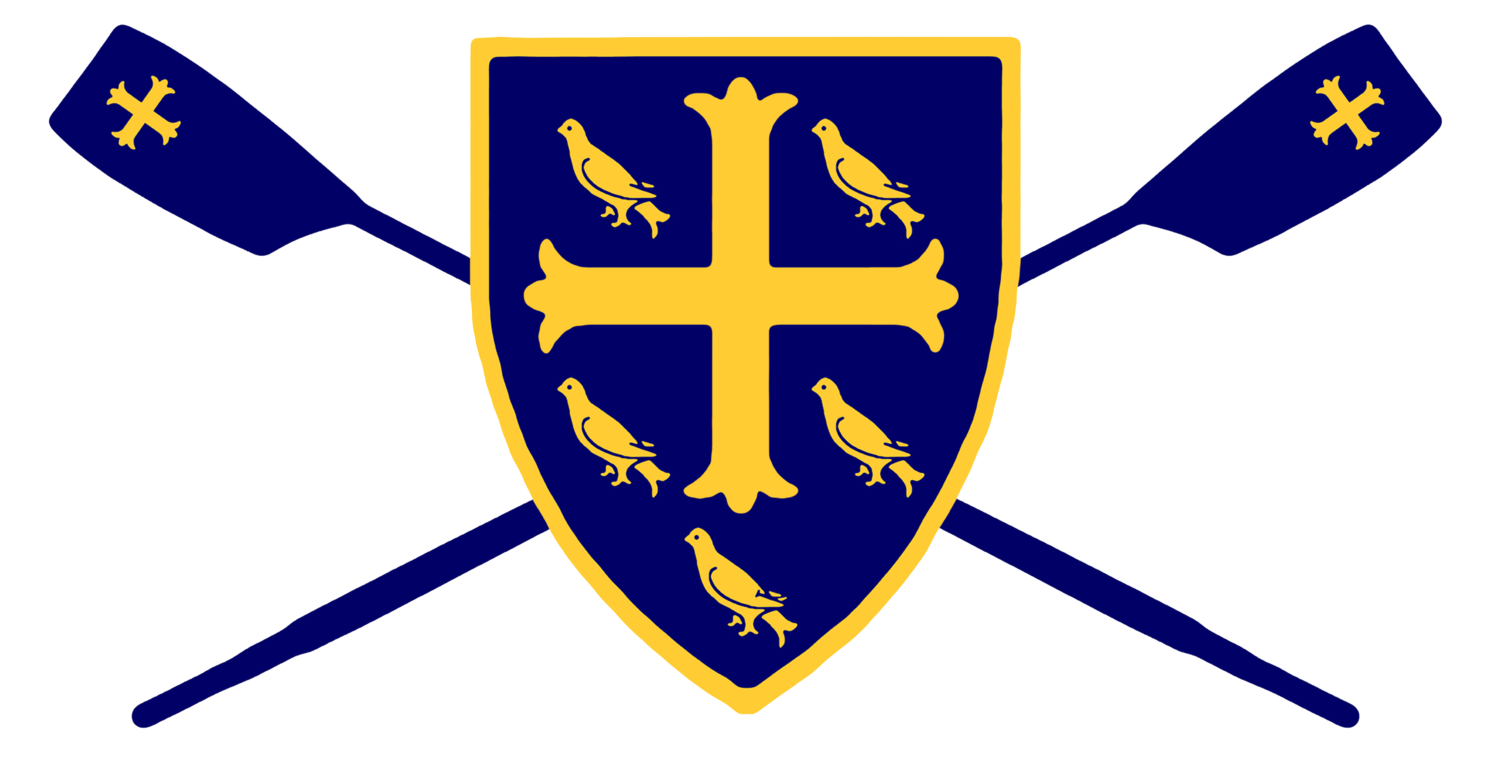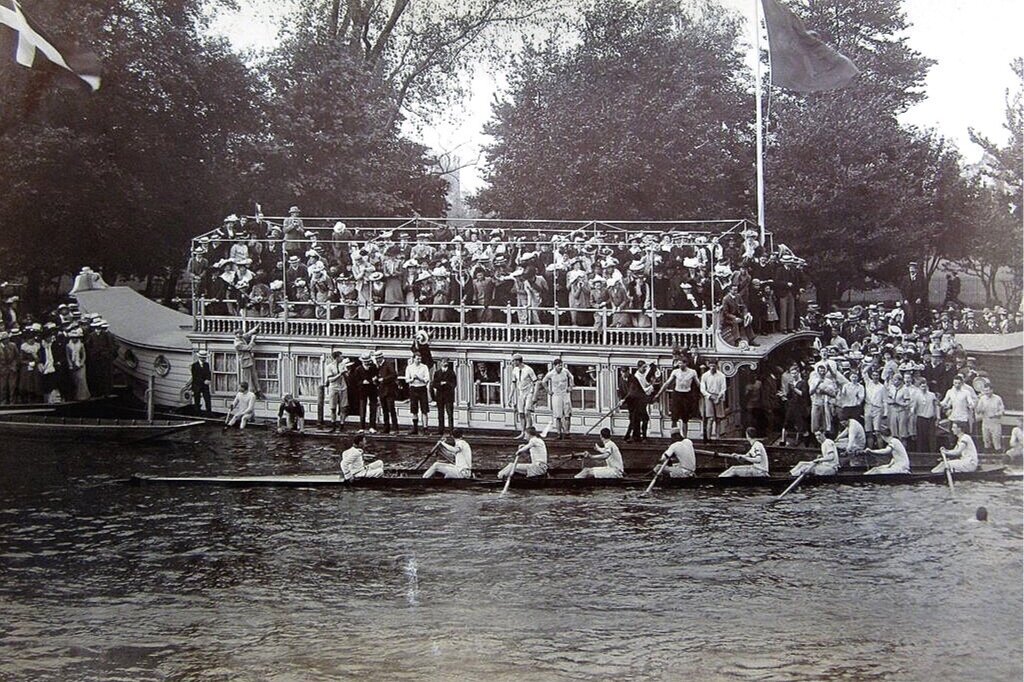
History of UCBC
By Dr. Robin Darwall-Smith, FSA, FRHistS University College Archivist
Origins
Boat races between Colleges can be traced back to 1815, becoming regular events by the late 1820s, but it wasn’t until 1827 that a Univ. crew first took part. One alumnus of the time, William Rooper (matr. 1825) remembered the club’s creation in his memoirs, published in 1893:
“A College meeting was held in my rooms at which upwards of £100 was subscribed, and a Committee appointed to order and superintend the building of a boat by Searle of Lambeth and to select a crew. A strong crew was formed. My place was bow or number one, my weight being nine stone six pounds, which has varied little through life.”
1820s rowers were evidently rather lighter than their modern counterparts! The University College Boat Club is therefore the oldest sports club in the College, and looks forward to celebrating its 200th birthday in 2027. UCBC, however, took a bit of time to settle: there is no evidence, for example, that it took part in Eights Week in 1829 or in 1832–8, but since 1839 a Univ. crew has participated in every inter-Collegiate rowing tournament since.
At first, the only such races took place in Eights Week, but in the 1830s, a second series of races, known as “Torpids” came into being. Originally, Torpids appears to have been held for crews inferior to those who rowed in Eights Week, and were held around the same time, but they were moved to their current time of Hilary Term in 1852. UCBC first entered a boat for Torpids in 1841.
The end of Eights Week 1914: members of the College get ready to celebrate a Head of the River Dinner (from the photograph album of William Bryan Todd-Naylor).
Early Triumphs
Univ. first went Head of the River in 1841, but undoubtedly our greatest period was in the late 1860s and 1870s. During this period we went Head of the River in Eights Week in 1869, 1870, 1871, 1874, 1875, 1877 and 1878, and in Torpids for five years running in 1869–73. The rowers of the 1870s were always happy to celebrate their successes. In February 1872, when the College won Torpids for the fourth consecutive year, the official boat club journal could not restrain its enthusiasm:
“HEAD OF THE RIVER for the 4th year in succession “HOOROO “WELL ROWED EVERYBODY “Splice the mainbrace. “This night all including CY got very drunk.....”
It was a while before our crews enjoyed such successes again. Univ. did not go Head in Eights Week again until 1902 and 1914, nor in Torpids until 1905 and 1906. The cover photo of this page depicts the First Eight of 1902, victorious as Head of the River, rows back to the Univ barge to an appropriately rapturous reception (from the photographs of Philip Fletcher).
“Univ, though Balliol came near them were never in danger. Daniele had a bad finger. But rowed with splendid pluck in spite of it. The Eight supped with Snell and the rest of us joined then after supper, and had a glorious evening. Singing and shouting as well as our voices would let us”
— Extract from the journal of Charles Cree, January 25 1871
Victorian Rowing
Rowing quickly became the most popular sport in College, as it did throughout Oxford (undoubtedly it helped that its rudiments were easier for a novice to pick up than, say, cricket). One fresher of the 1850s was rather unimpressed to find that, as he was settling into his rooms, the first visitor he had was a member of UCBC inviting him to row (this particular fresher refused).
Eights Week quickly became one of the social events of the year. It was a popular time for families to visit, and early photographs show the College barged packed with mothers, sisters, and others all cheering the Univ. boats on. Torpids was never quite so popular, no doubt because of the bad weather, and then, as now, every so often it had to be cancelled due to the weather. In 1895, for example, the Thames was frozen so badly that a coach and horses could be driven across the Isis, and there is a family legend that the present writer’s grandfather was able to skate on the river all the way from Oxford to Henley.
One Victorian student, Charles Cree (matr. 1868) kept a diary for 1871. He was a keen rower, in all weathers. On 25 January he wrote:
“After lunch went to the river, and rowed twice to Iffley. Good hard frost the water freezing on the blades of the oars. My hand blistered and a great tendency to become like a cherub, i.e. by losing the power of sitting.”
Cree also remembered the celebrations when Univ. went Head of the River in Eights Week that year:
“Univ. Head in the EIGHTS. Univ, though Balliol came near them were never in danger. Daniele had a bad finger. But rowed with splendid pluck in spite of it. The Eight supped with Snell and the rest of us joined then after supper, and had a glorious evening. Singing and shouting as well as our voices would let us - Everything went off well no one being drunk.”
A copy of the UCBC Captain’s note book from 1864–92 survives, and has a lot of evidence about the Boat Club during these years. One important aspect is the light it sheds on student slang: individual Colleges, for example, got nicknames like “Belial” and “Quaggers”, and the notebook contains the earliest known examples of our own abbreviation of “Univ.”
The Univ Torpid of 1862 (from the official UCBC photograph albums). This is the earliest known photo of a UCBC crew.
UCBC from 1914 to 1945
Univ. went Head of the River in June 1914, just a couple of months before the First World War broke out. Two members of that First VIII were killed in the war, as was the cox of the Second VIII. Back in Oxford, no rowing competitions took place between 1915 and 1918, since the university was almost completely depopulated. When competitions restarted in 1919, it was still on a limited basis (Univ. had to combine with Exeter for Torpids 1919), and it was not until 1920 that the Eights Week and Torpids were back to normal again. Unfortunately, the Univ. First VIII then plummeted from Head to 7th. During the 1920s and 1930s rowing continued to play a major part in College life, and the First VIII had some exciting years. We were runners up in Eights Week in 1930 and 1931, and went Head in Torpids in 1926.
During the Second World War, undergraduates were allowed to remain at Oxford, albeit on specially shortened courses, and so Eights Week and Torpids were able to continue on a reduced basis. It was not always possible, thought, for Colleges to field teams on their own. In 1940 and 1941, therefore, Univ. combined with Merton (several of whose students had been evacuated here during the war) to compete in a joint eight.
The Univ First Eight of 1914 formally posed by the Univ Barge (from the photograph album of William Bryan Todd-Naylor).
The Univ First Eight of 1914, Head of the River that year (from the photograph album of William Bryan Todd-Naylor). Two members of this crew were killed in the First World War. For more on this crew and their fates during the war, read here.
UCBC after 1945
Torpids and Eights Week resumed properly in 1946, and crews were arranged that year in their 1939 positions (the war races were not reckoned to count). During this time, UCBC had a supporter in high places: Clement Attlee, Prime Minister from 1945–51, had been at Univ. in Edwardian times, and, although he never rowed himself, he was always proud of Univ.’s great sporting reputation from that period, and he remained a devoted Old Member of the College. The club’s archives therefore include a letter from the Prime Minister’s Office, thanking the Secretary of the Boat Club for sending Attlee a copy of the Eights’ Week Programme for 1949.
Although a succession of Univ. rowers have won their Blues, and we did enjoy some successful times in the postwar years, most notably in the 1970s, when we were in the top five crews on several occasions, undoubtedly a highlight of UCBC history since 1945 was when we went Head of the River, for the first time in 76 years, in 1990 and 1991. For the 1990 celebrations, an old boat was brought into the Main Quad to be burnt after the Bump Supper. Unfortunately, during dinner, the story goes that some jealous Oriel rowers crept into College and stole the boat. The alarm was raised; a crowd of Univ. rowers in evening dress set off in hot pursuit, and the boat was recovered and brought back safely.
Another major event in the rowing life of the College took place in 1979, when Univ. went mixed. In that very first year, the first women’s eight was formed, and managed to compete in Eights Week 1980. The women have since fought their way up the tables, and in Eights Week 2001 their first eight was in division I - higher than the men! Rowing has continued to be a popular sport within College, and several of our great Old Members have been UCBC members. Professor Stephen Hawking, for example, coxed when he was studying Physics as an undergraduate here in the 1950s.
Images from 1952
Courtesy of Colin Honey
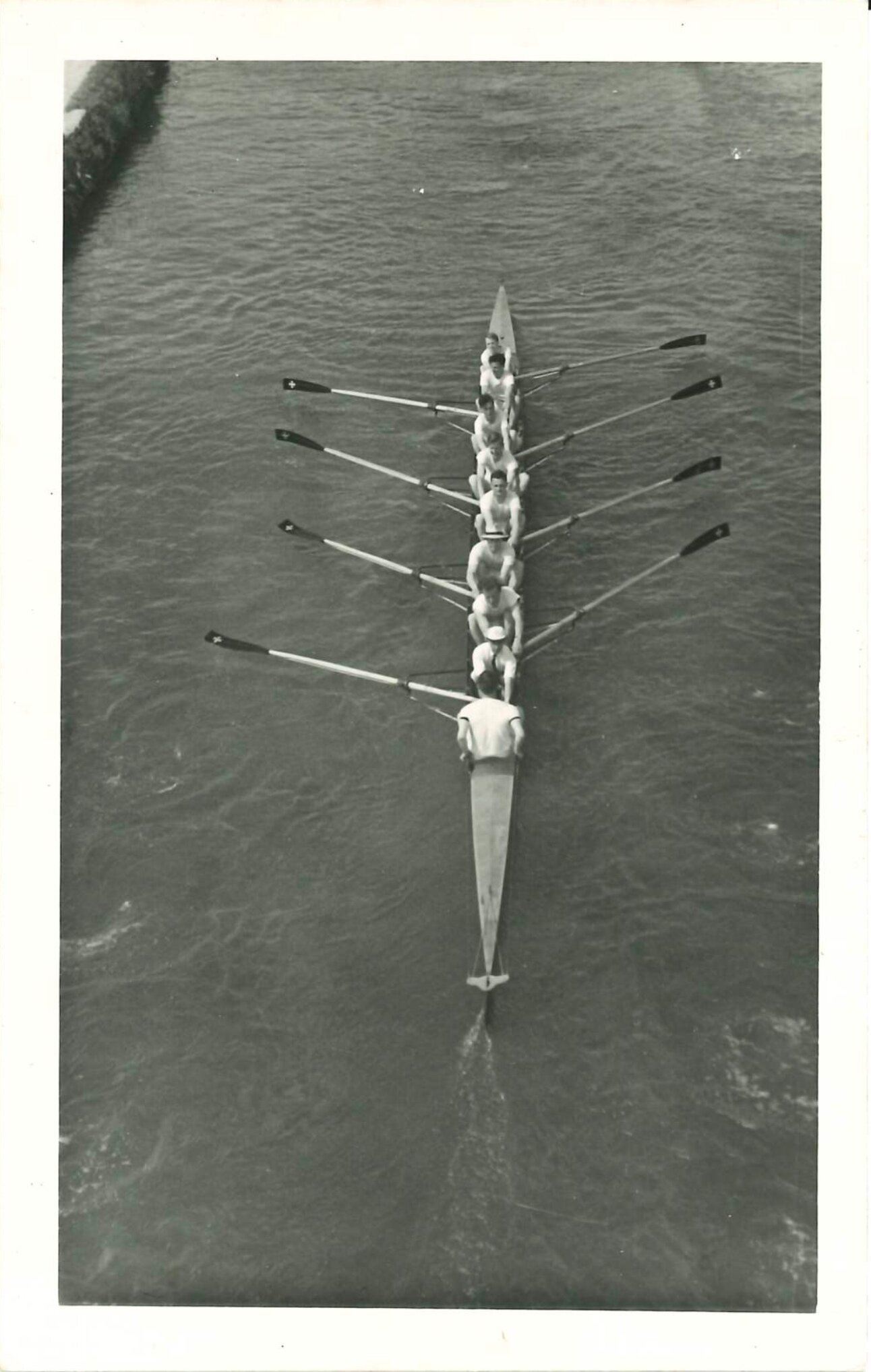
Univ IV Summer 1952 From the New Bridge, cox stroking
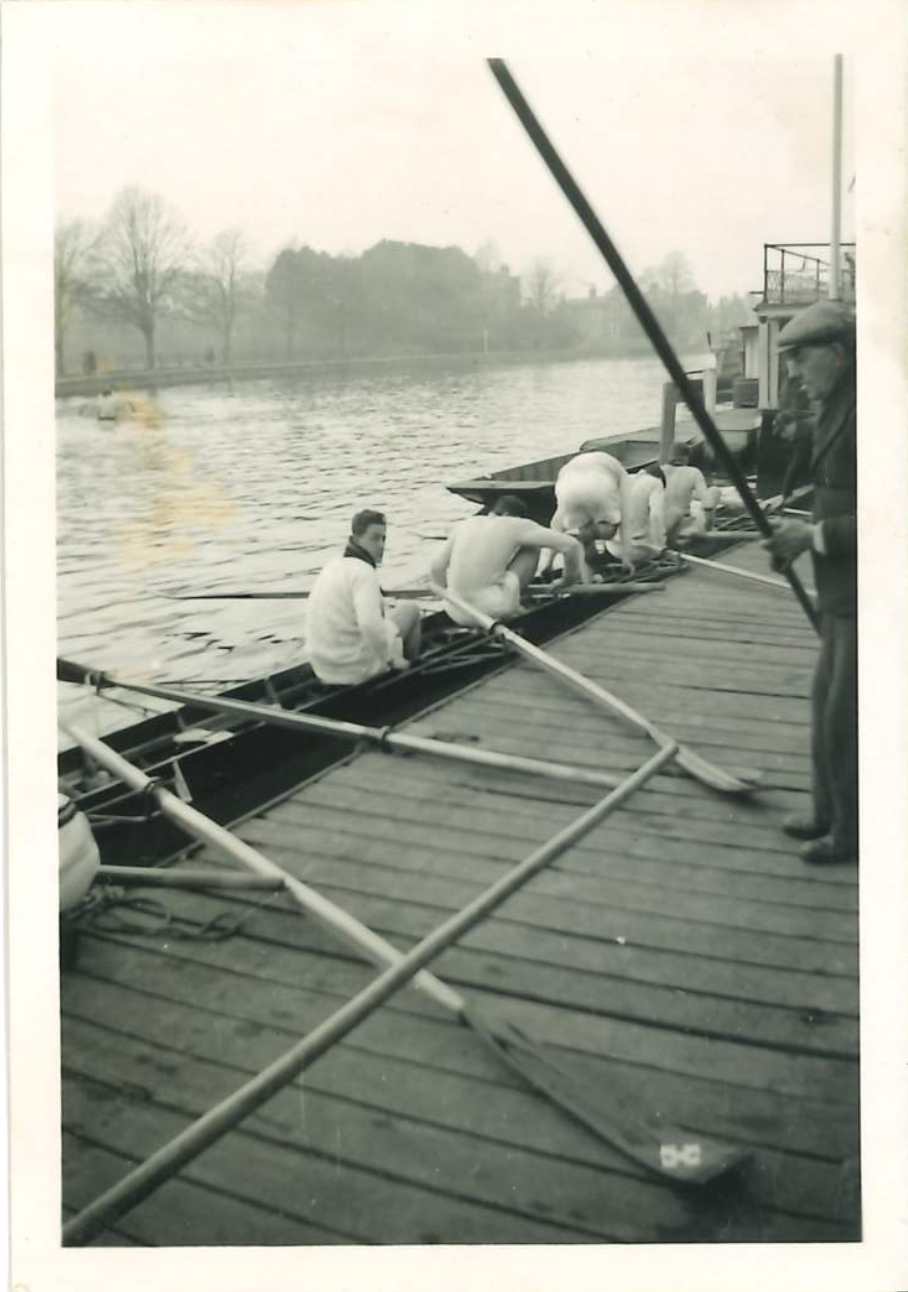
Univ 1st Torpid 1952
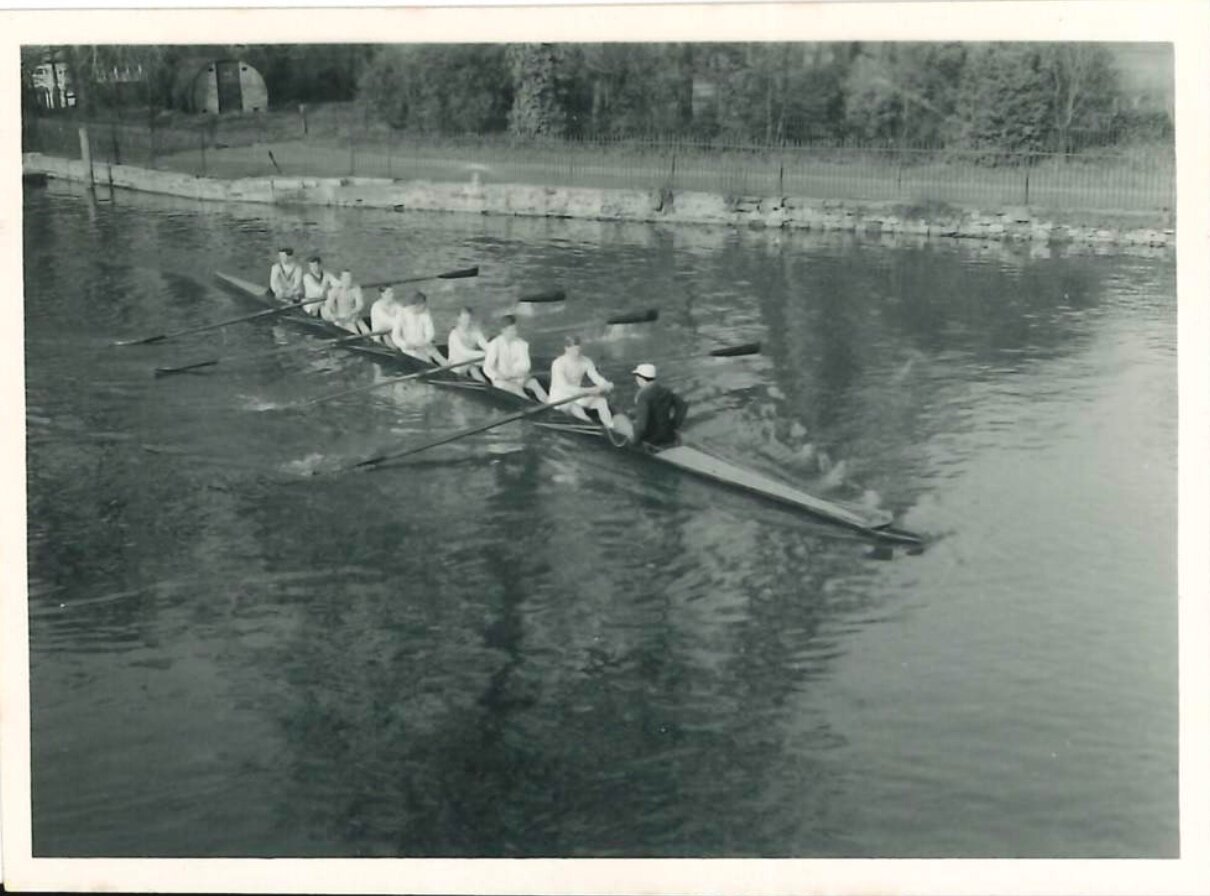
Univ 2nd Torpid - turning outside Salters
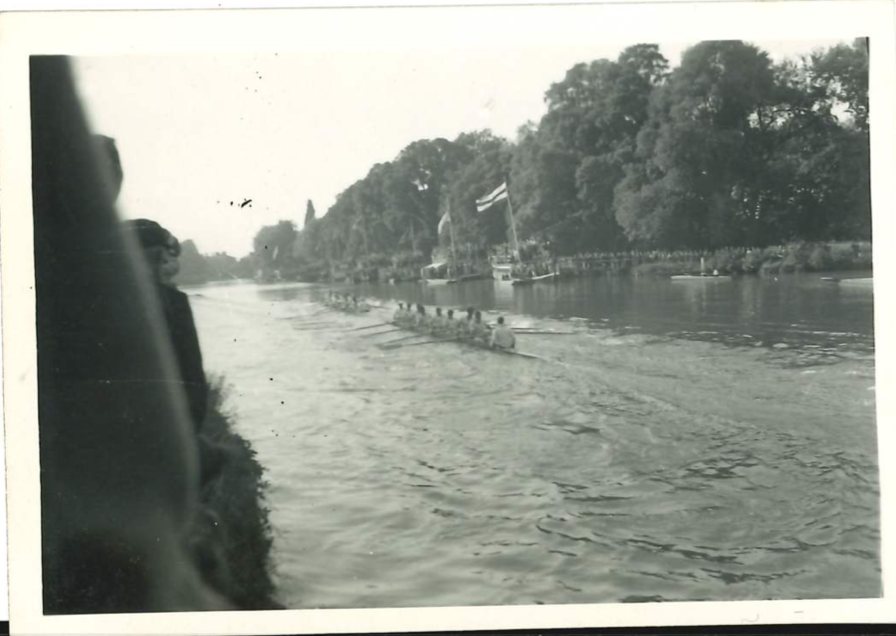
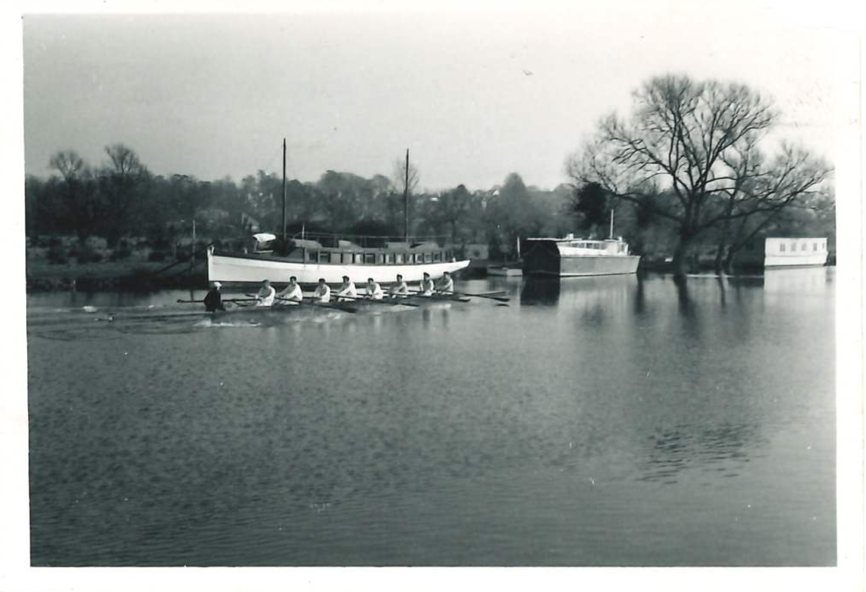
Univ 2nd Torpid - rowing down to the start Feb 1952
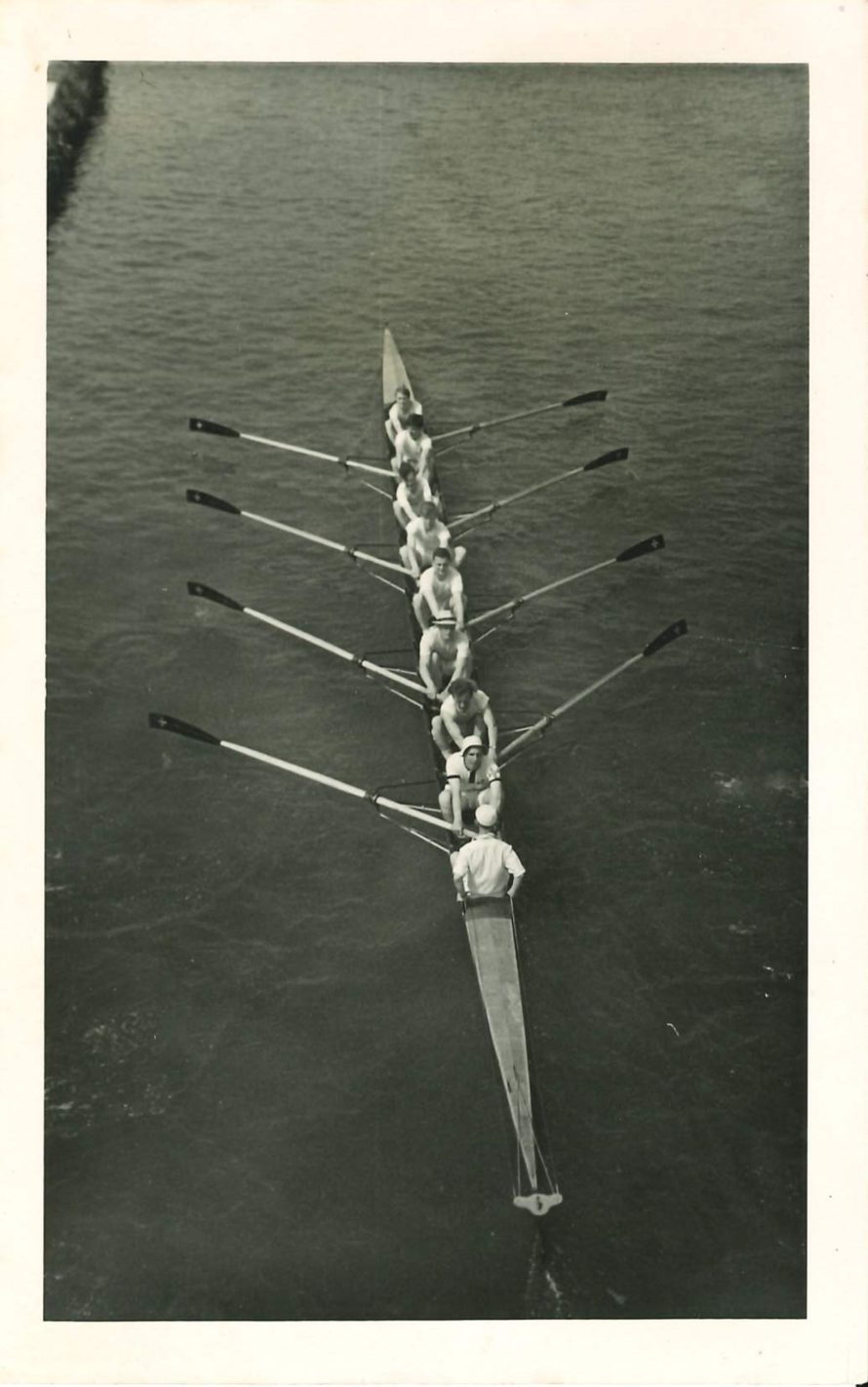
Univ IV ('Schools' Eights), Summer 1952 Bow Ted Enfield 2 Butterfield 3 David Rait 4 Colin Honey 5 Charles Napier 6 Michael (unknown) 7 Nigel Amos Stroke Alan Luff Cox Tony Palmer
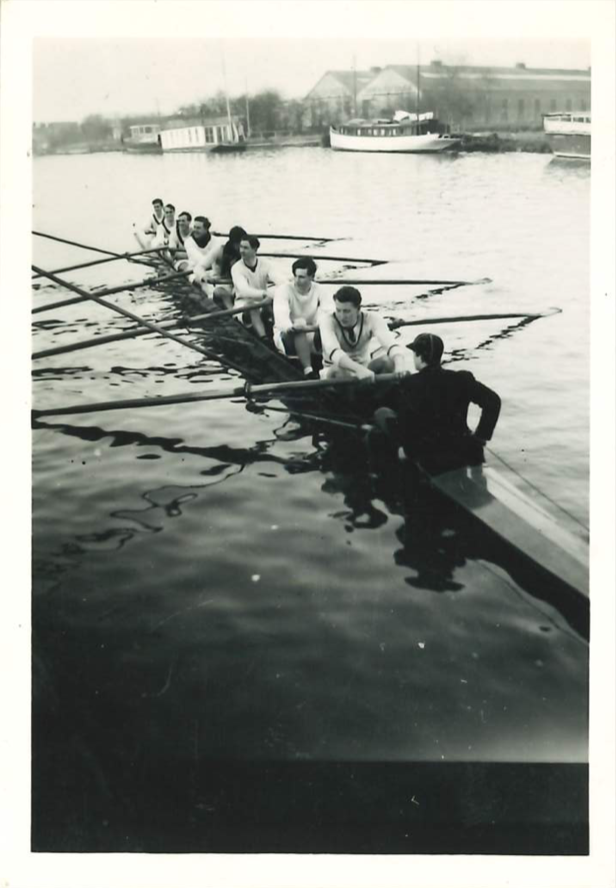
Univ 1st Torpid 1952
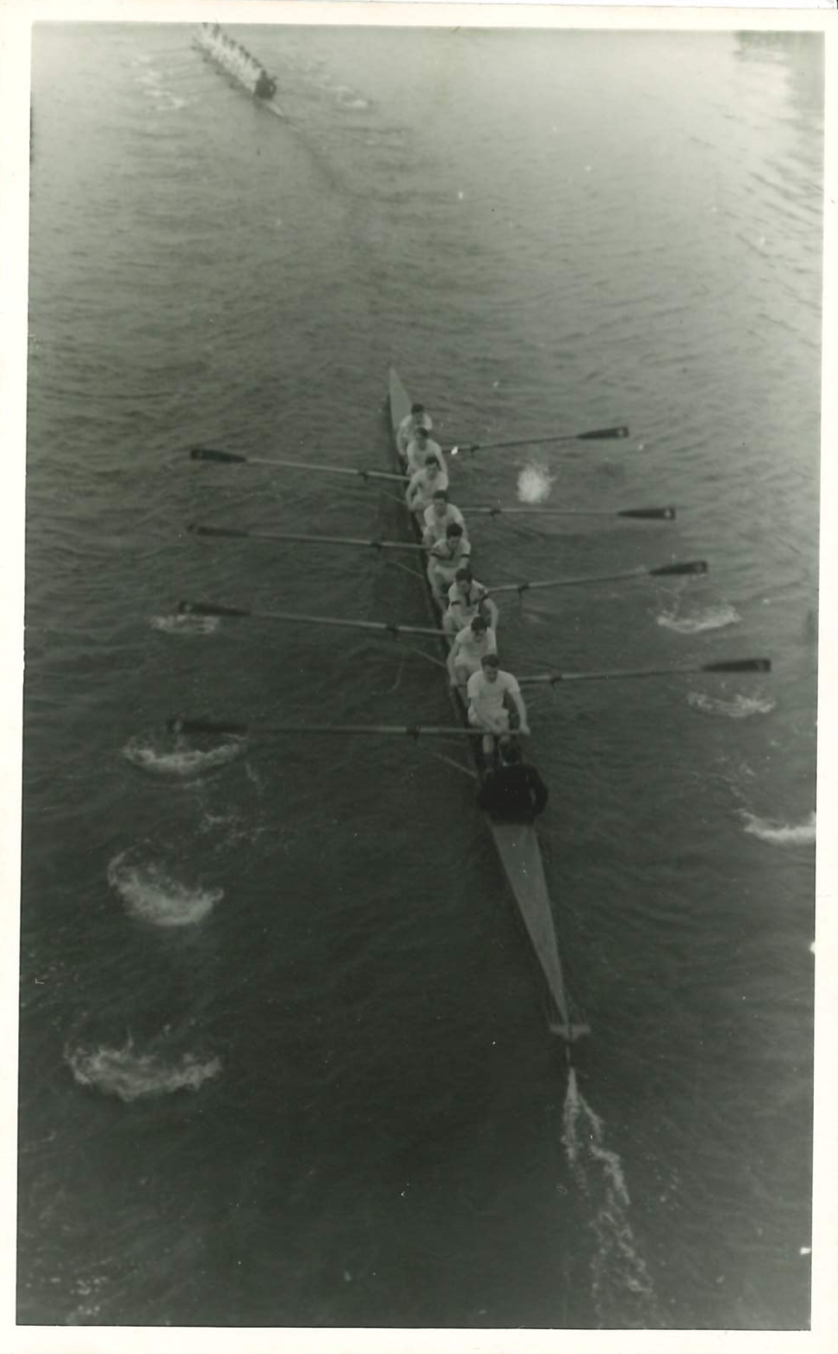
Univ 1st Torpid Feb 1952, In action just above the New Bridge. Bow Malcolm Nock, 2 John Hoult, 3 David Main, 4 Rodney Burge, 5 John Poole, 6 David Davenport, 7 John Davenport, 8 Jeffrey Howles, Cox Wally Marsh
Summer Eights Booklet 1951
Courtesy of Colin Honey
Some Univ. Rowing Olympians
Four Old Members of Univ. have so far won Olympic medals for rowing: Colin Moynihan (1974): silver medal (UK; coxed eights), Moscow 1980. Mark Evans and his twin brother Michael (both 1982): gold medals (Canada; coxed eights), Los Angeles 1984. Acer Nethercott (1996): silver medal (UK; coxed eights), Beijing 2008.
Stephen Hawking coxes the Men's rugger V111 in 1963
Boats, Barges and Boathouses
Originally the Boat Club owned very few of its own boats, renting them regularly from local firms like Salters; this was typical of Colleges at this time. In more recent years, it has owned all its own boats, and depended greatly on the goodwill of Old Members for maintaining and replacing them. When first created, the College boat clubs did not even have any allocated space on the river for headquarters, but there was then a stroke of luck. Until the mid-nineteenth century, part of the Lord Mayor’s Show in London had included a grand river pageant at which all the city companies and guilds would be rowed down the Thames, each in their own livery barge. Then the annual pageants were stopped, and the companies and guilds decided to sell off their barges. Several went to Oxford Colleges, including Univ. We were among the first Colleges to exploit this opportunity, and our barge, acquired in 1854, used to be belong to the Merchant Taylors’ Company. This barge was sold in 1872, and its successor (also a livery barge, this one formerly owned by the Stationers) bought from Exeter College in 1873. Early photographs of both these barges still survive.
Finally, in 1878, the Boat Club commissioned a brand new barge from John Oldrid Scott (who later built the Oxford University Boat Club’s boathouse), and built by Sam Saunders at Streatley. It was first used by the College in 1880, and remained in use until 1965, when it was sold to private ownership. After some years in disrepair, the barge was sold to a new owner, and has been excellently restored to its original condition. After the sale of the barge, the College occupied space in the boathouse of Oxford University Boat Club, until its tragic loss in a fire in 1999. Fortunately the archives of the College Boat Club had long been transferred to the College archives, where they still safely remain. Univ’s new boathouse was opened in 2007, read more about our new building via the Boathouse page.
